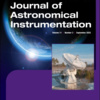
First batch of papers to be printed in upcoming issue of Journal of Astronomical Instrumentation
CAMBRIDGE, MA — May 24, 2023 — The Galileo Project at Harvard University today announced the online publication of its first seven scientific papers, to be printed in an upcoming special issue of the Journal of Astronomical Instrumentation. An eighth accepted paper is in press, to be published soon. The peer-reviewed papers, covering various aspects of the methodology and instrumentation developed for the project, provide the most complete description yet of the project's scientific investigation.
In addition to an overview of the research program and objectives, these papers encompass the wide range of subject areas involved in the work, from new detection methodologies to novel instrumentation development targeting Unidentified Aerial Phenomena (UAP), to theoretical considerations concerning a mission to intercept interstellar objects (ISOs) of unknown origin.
Leading the charge in this pioneering effort is Dr. Avi Loeb, the co-founder and head of the Galileo Project.
“I am deeply proud of our team and what we have accomplished so far,” said Loeb. “These publications mark the beginning of a new era in the investigation of UAP and ISOs. Our researchers have worked hard to find new ways to apply the state of the art across many disciplines, seeking to answer questions that could never be adequately answered before now. With many of the instruments described in these papers now operational and producing data, I'm excited about the discoveries that lie ahead.”
Since submitting the papers for peer review, the Galileo Project’s international and cross-institutional team has been busy testing and calibrating the many sensors and tools developed for this unique astronomical effort. Having field-tested the equipment even through the extreme weather of a New England winter, the project is now looking to leverage what it learned in phase 1 and bring additional locations online across the United States. Galileo Project researchers are simultaneously preparing for an upcoming expedition to collect remnants of the first documented interstellar meteor, and developing software to analyze data recorded both by field instruments as well as by Earth-observing satellites.
All Galileo Project papers are freely available to the public with Open Access at the Journal of Astronomical Instrumentation’s website, https://www.worldscientific.com/worldscinet/jai. A list of all published papers is available in the Publications section of the Galileo Project website, at https://projects.iq.harvard.edu/galileo/publications.
Download the complete press release here (PDF).
For more information or media inquires, please contact:
Professor Avi Loeb
Harvard Astronomy
Center for Astrophysics | Harvard & Smithsonian
Head of the Galileo Project
aloeb@cfa.harvard.edu




